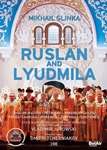|
Back
12/04/2016
Mikhail Glinka: Ruslan and Lyudmila
Albina Shagimuratova (Lyudmila), Mikhail Petrenko (Ruslan), Yuri Minenko (Ratmir), Alexandrina Pendatchanska (Gorislava), Charles Workman (Finn, Bayan), Almas Svilpa (Farlaf), Elena Zaremba (Naina), Vladimir Ognovenko (Svetosar), Alexandre Polkovnikov (The Head), State Academic Bolshoi Theatre of Russia Orchestra and Chorus, Valery Borisov (Chorus Master), Vladimir Jurowski (Conductor), Dmitri Tcherniakov (Stage Direction and Set Designer), Elena Zaytseva (Costume Designer), Gleb Filshtinsky (Lighting Designer), François Duplat (TV and Video Producer), Andy Sommer (TV and Video Director)
High definition recording: Bolshoi Theatre, Moscow (November 2011) – 232’ (including bonus)
2 DVDs BelAir Classiques BAC120 – Sound 2.0 PCM – Format 5:1 Dolby Digital – Color, 16:9 – Region 0 – Subtitles in English, French and German – Booklet in English, French and German (Distributed by Naxos of America)

   
After a seven year renovation, the Bolshoi asked director Dmitri Tcherniakov to choose a work, fitting for the theatre’s reopening. Of importance was to trace back to the progenitor of Russian classical opera and Mikhail Glinka; hence, Ruslan and Lyudmila. This five act opera had groundings for a Tcherniakov statement since the production would be a “Big Show” for a “Big” (English translation for “Bolshoi”) venue.
Contrasted to a highly successful A Life for the Tsar in 1836, Glinka’s subsequent Ruslan and Lyudmila received a cool reception. It’s no surprise: the prolix œuvre is unwieldy, tedious and fragmented. Glinka, known to have composed the opera in a jerky, disoriented manière, must have titillated the director to establish greater relevancy in today’s world by bridging traditional aspects of a Russian fairy tale (Acts I and V) with a higher degree of living “in the now” (Acts II, III and IV.) The gesture symbolically honors the Bolshoi’s repeated transmogrifications. Those not well versed in this opera may be a bit confounded, much like the way Glinka erratically composed his score.
As he did in the Netherlands Opera 2012 production of Rimsky-Korsakov’s The Legend of the Invisible City of Kitezh, Dmitri Tcherniakov brings back his own “cabinet members” (including Zaytseva’s costuming and Flishtinsky’s lighting) to create a mélange of wildly different settings. Tcherniakov is quoted, “there was no traditional way of performing it [Ruslan and Lyudmila.]” Thus, Pushkin’s poem offers wide berth for dramatic display, relished by the Ukrainian native.
Vladimir Jurowski moves through Glinka’s score with mathematical wizardry. After a brilliantly executed Overture, the music unfortunately becomes supplementary since Tcherniakov’s disjointed detailing overtakes.
Since Ruslan and Lyudmila is all about the idea of two young lovers’ faithfulness being put to the test, Tcherniakov resorts to modern times. His use of two gigantic screens (new Bolshoi installments) embolden the treacheries of Elena Zaremba’s Naina and Charles Workman’s Finn in a quasi-Soviet Eisenstein-esque silent film. Temptation also comes in two waves. Firstly, for Ruslan while he’s housed inside a brothel-like chamber, filled with a harem of mish-mashed dressed women. Secondly, for Lyudmila who experiences a Thai massage and a hunky masseur, all the while being entertained by a small white uniformed orchestra and Kobe Steakhouse chefs purportedly inserted into the “Oriental Dances.”
The opera’s broad swath of superficiality finally brakes in Act IV when Albina Shagimuratova gifts us with her exhaustive efforts to thwart Chernomor’s advances during her “Scene and aria.” Complete pathos overtake us, and for a generous period of time we’re funneled into her plight. It is truly moving. Mikhail Petrenko’s Ruslan gives us a moment of fear when we’re thrown into an oppressive gulag strewn about with dead bodies…realistic and riveting.
Another vocal treasure can be found with Yuri Minenko in the role of Ratmir. Although the character calls for a mezzo-soprano, Tcherniakov chooses to use this counter tenor who has the passion and diction of love and sincerity, especially when he reunites with his long lost love, Gorislava, well nuanced by Alexandrina Pendatchanska.
Few DVD productions of Ruslan and Lyudmila are currently on the market, so we treat this aspect as a respectful option. We find this a striking, yet jolting experience. Dmitri Tcherniakov’s vision is understandable, but it simply exacerbates the frustration with Mikhail Glinka’s music: it traipses.
Christie Grimstad
|